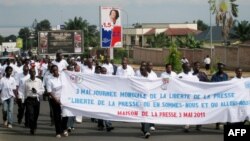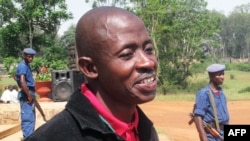NAIROBI —
Journalists and activists in Burundi are opposing new legislation they say will infringe on press freedoms and lobbying the president to reject the bill.
Last week, Burundi’s senate approved a new media bill that would force journalists to disclose sources, and bans the press from reporting on issues deemed too sensitive, including public security, defense and the economy. Media houses that overstep the boundaries could face thousands of dollars in fines.
Bob Rugurika, editor in chief of Radio Publique Africaine (RPA) in Burundi, says the restrictions are unacceptable.
There are many, many restrictions, he said. The law prevents reporters from working on news about security, the economy, the currency, according to Rugurika.
Right groups including the Committee to Protect Journalists and Amnesty International have urged President Pierre Nkurunziza to reject the new law, which they say undermines press freedom.
The bill was passed by an overwhelming majority in both the national assembly and the senate, which have been under the complete control of the ruling party since the opposition boycotted the last election in 2010.
Lawmakers have said the bill will protect the country’s citizens and leaders.
The director of RPA, which tends to align with the former opposition, has started a petition urging the international community to put more pressure on the government.
Rugurika said they are trying to “alert the world.”
The director sent the petition to American senators and politicians because those are the partners of our government, he said, pointing out that they can help activists make the government understand that they are heading in the wrong direction.
Burundi's government has a recent history of being heavy-handed with journalists. Rugurika himself has been detained several times by police over the past few years.
In 2011, he was questioned for 10 hours after broadcasting an interview that implicated state forces in a massacre that killed 40 people.
In March, authorities released Hassan Ruvakuki, a journalist arrested in 2011 on terrorism charges after he met with rebels in Tanzania.
He said he was only doing his job at the time, and the charges were reduced during his appeal.
Last week, Burundi’s senate approved a new media bill that would force journalists to disclose sources, and bans the press from reporting on issues deemed too sensitive, including public security, defense and the economy. Media houses that overstep the boundaries could face thousands of dollars in fines.
Bob Rugurika, editor in chief of Radio Publique Africaine (RPA) in Burundi, says the restrictions are unacceptable.
There are many, many restrictions, he said. The law prevents reporters from working on news about security, the economy, the currency, according to Rugurika.
Right groups including the Committee to Protect Journalists and Amnesty International have urged President Pierre Nkurunziza to reject the new law, which they say undermines press freedom.
The bill was passed by an overwhelming majority in both the national assembly and the senate, which have been under the complete control of the ruling party since the opposition boycotted the last election in 2010.
Lawmakers have said the bill will protect the country’s citizens and leaders.
The director of RPA, which tends to align with the former opposition, has started a petition urging the international community to put more pressure on the government.
Rugurika said they are trying to “alert the world.”
The director sent the petition to American senators and politicians because those are the partners of our government, he said, pointing out that they can help activists make the government understand that they are heading in the wrong direction.
Burundi's government has a recent history of being heavy-handed with journalists. Rugurika himself has been detained several times by police over the past few years.
In 2011, he was questioned for 10 hours after broadcasting an interview that implicated state forces in a massacre that killed 40 people.
In March, authorities released Hassan Ruvakuki, a journalist arrested in 2011 on terrorism charges after he met with rebels in Tanzania.
He said he was only doing his job at the time, and the charges were reduced during his appeal.





